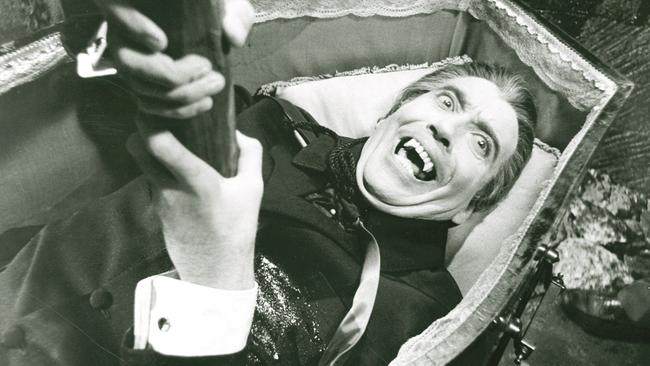Debonair villain we loved to hate
Tall, aristocratic and debonair, with a rich baritone that seemed to come from deep caverns below the earth, the late Christopher Lee was never going to be romantic leading man material.

Today in History
Don't miss out on the headlines from Today in History. Followed categories will be added to My News.
Tall, aristocratic and debonair, with a rich baritone that seemed to come from deep caverns below the earth, the late Christopher Lee was not romantic leading man material. Which is why he usually played the bad guy and did it so superbly.
Lee scared the pants off generations of filmgoers playing villains. In between there was the odd role as a military man, a foreigner or a nobleman, but mostly we enjoyed his menace, the air of superiority as he lorded over the good guys with such panache.
Yet even among his evil roles he showed great range. He played many shades of evil, from the unhinged psychotic of Dracula to the more subtle, charming menace of Lord Summerisle who (spoiler alert) despite killing off the hero, in the 1973 film The Wicker Man, never comes off as completely bad.
Lee had a long career in films but some of his most famous roles, including the evil Saruman in The Lord Of The Rings trilogy and the Jedi master turned to the dark side Count Dooku in the prequel Star Wars trilogy, came later in life.
While his on-screen villainy belied the gentleman he was in real life, it is perhaps not surprising that he played lords, counts, dukes and aristocratic officers. The son of an Italian countess Estelle Marie Carandini di Sarzano and a British father, Lieutenant Colonel Geoffrey Trollope Lee, he was born in Belgravia, in central London in 1922.
He developed at taste for acting at school, appearing in plays but his acting career did not kick off until after World War II.
During the war Lee quit his job as a clerk to volunteer for service in Finland fighting the Nazis, but he was kept away from the action. He later joined the RAF, but medical problems prevented him finishing pilot training and he eventually transferred to intelligence, working with the Special Operations Executive sometimes behind enemy lines in North Africa.
He also commanded Gurkha troops at the Battle of Monte Cassino and finished the war with the rank of Flight Lieutenant. He resigned from the RAF in 1946 and finally returned to his boyhood dream of becoming an actor. At first he was told he was too tall, but was eventually signed on to play extra roles and bit parts with the Rank Organisation in 1947.
The studio sent him to “charm school” and put him through a virtual apprenticeship that he later said lasted 10 years. Among the roles he played at this time was a man carrying a spear in Olivier’s Hamlet in 1948. His height worked to his advantage in being cast as the monster in the 1957 Hammer film The Curse Of Frankenstein.
His dark, foreign good looks and noble bearing also helped with casting for Dracula (1958), the role that would make him a star. He reprised the role of Dracula in several other films, although he later said he felt “blackmailed” into playing the role by the studio who told him he would be putting people out of work if he didn’t do it.
Hammer had him play other horror roles, including the title character in The Mummy (1959), but he got to show his human acting chops with roles such as Sir Henry Baskerville in the Sherlock Holmes thriller The Hound Of The Baskervilles in 1959. In the ’60s he also became famous playing the evil Fu Manchu in a series of films. Trying to move beyond playing monsters, mad professors and evil geniuses, he took on the role of Lord Summerisle, giving him a chance to play a less black and white villain, returning to playing the charmingly unambiguously evil Scaramanga in The Man With The Golden Gun in 1974.
He left England in 1977 hoping to escape the typecasting by playing a more interesting range of roles. He came to Australia to play the bad guy in the comedy superhero spoof The Return Of Captain Invincible in 1982.
Always in demand through the ’80s and ’90s, including a turn playing Sherlock Holmes in two TV movies, it was when he took on the role of Saruman in 2001 and Count Dooku in 2002 that he returned to stardom and became known to new generations.
Lee died on June 7 after experiencing respiratory problems and is survived by his wife Birgit Kroencke and their daughter Christina.
Originally published as Debonair villain we loved to hate



